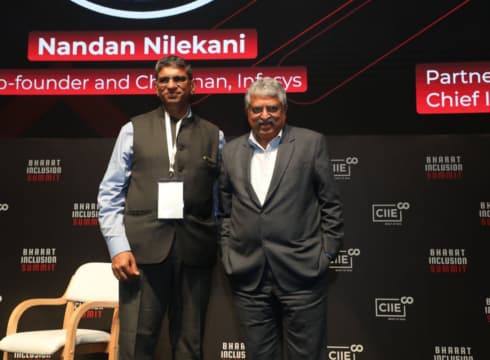Nandan Nilekani said that the fall of cryptocurrency exchange FTX in the US has shown that private cryptocurrencies are not a big threat
Speaking on CBDCs, the former UIDAI chairman said that they can reduce costs, especially for cross-border settlement
Nilekani reiterated his confidence in the account aggregator framework, saying it would make availing credit as simple as making digital payments
Inc42 Daily Brief
Stay Ahead With Daily News & Analysis on India’s Tech & Startup Economy
Infosys cofounder and non-executive chairman Nandan Nilekani doesn’t see private cryptocurrencies as a threat to fiat currencies.
Speaking at the Bharat Inclusion Summit in Bengaluru, Nilekani reportedly said that the fall of cryptocurrency exchange FTX in the US has shown that private cryptocurrencies are not a big threat.
The statement comes at a time when the Indian government has been tightening regulations around cryptocurrencies, including the introduction of tax on income from crypto and TDS on crypto transactions last year, and has also been pushing for global regulations for it. Earlier, Nilekani backed cryptocurrencies as an investment asset class while also emphasising the need for regulatory oversight.
Speaking at the Summit on March 3 (Friday), Nilekani said that central banks are thinking of central bank digital currencies (CBDCs) because of the rise of private cryptocurrencies.
Explaining the need for the CBDCs, he said, “…for instance, on the wholesale side, especially cross-border settlement, these currencies can further reduce costs.”
It must be noted that the Reserve Bank of India (RBI) launched the pilot for wholesale and retail CBDCs a few months ago. The central bank has onboarded several banks, including the State Bank of India, ICICI Bank, IDFC First Bank, Bank of Baroda, Yes Bank, HDFC Bank, and Kotak Mahindra Bank, to run the pilots.
Speaking on India’s digital ecosystem, the former chairman of the Unique Identification Authority of India (UIDAI) said that account aggregator (AA)-based lending is expected to rise in a big way and availing credit would become as simple as making digital payments.
“In 2016, the RBI came out with standards for AA. It took several years to build AA and we are on the verge of take-off. AA-based lending will…reach millions of businesses,” Nilekani said. “Now, the next big thing will be credit and people will be able to give data. Getting lending will be as simple as making payments. Credit is the heartbeat of the economy.”
The AA framework is a protocol that will allow financial institutions such as banks, NBFCs, and insurance companies to share user information such as credit score with each other, making it easier for people to avail credit.
This is not the first time that Nilekani has spoken about the transformational changes which the AA framework will bring. Earlier, he said that the AA framework, along with the Open Network for Digital Commerce (ONDC), would power ‘significant economic activity’ in the country and open up new avenues for startups and entrepreneurs.
The AA framework is part of the India Stack, a set of open APIs and digital public products covering identity, payments, among others. It includes Aadhaar, ONDC, and UPI, among others.
{{#name}}{{name}}{{/name}}{{^name}}-{{/name}}
{{#description}}{{description}}...{{/description}}{{^description}}-{{/description}}
Note: We at Inc42 take our ethics very seriously. More information about it can be found here.


